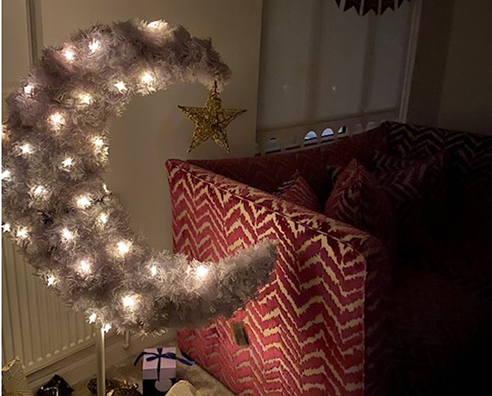
This month is Ramadan (13th April – 13th May), a period of fasting and reflection for Muslims. Staff, students and members of the wider community are observing the Islamic holy month, which marks the time of the revelation of the Quran, and like 2020, it falls during a period of social distancing.
Members of our community have taken the time to share their thoughts about the teachings behind the holy month and how it affects them in their daily lives.
Zaina-Hibbah Malik (Year 6)
“I found fasting very easy actually as I had been practising from last year too. With my family supporting me, it felt easier than I thought it would be. Also, I ate a lot for suhoor so that has also kept me going throughout fasting.”
“Fasting with your family is just such a nice feeling and the food that my mum makes is so yummy! I can’t wait for Eid because my mum will make delicious food. I also have an Eid tree (pictured) which we put our presents under (it’s a shape of a moon).”
Manal Hussain (Year 10)
“Fasting during Ramadan affects me emotionally, physically and spiritually. It’s a month which brings you closer to Allah and makes you aware of the less fortunate as you’re reminded by your hunger. You start to feel connected to Muslims all over the world, it’s the month of forgiveness, as you start to ask forgiveness from family, friends and Allah it increases your humbleness. And after the month has ended you feel a sense of satisfaction and love for Islam even more.”
Hanifah Miah (Year 10)
“In the month of Ramadan, people often fast and reflect on their life. People often try their best to improve themselves spiritually and they work on their closeness to God. During this month, we are all in this together. We are all becoming better people, better Muslims and paving a road of goodness together. I enjoy this comforting unity greatly, and I feel more motivated to do good. Every Ramadan I strive to become a better person than I was before and my love for my religion, Islam, and Allah (God) grows.”
Noor Jameel (Year 10)
“I think that Ramadan is a great opportunity to better ourselves as a person and become closer to Allah. This can be done by making sure we complete all of the prayers and reading more of the holy Quran. The purpose of fasting is to empathise towards people that do not have any food. This encourages us to give to charity which is one of the five pillars of Islam.”
Rihana Sultana (Year 8)
“Currently, we are in the month of Ramadan, the ninth month of the Islamic calendar where Muslims do a period of fasting to be closer to our faith. Usually, we fast from morning (suhoor) until when the sun sets (iftar). During the day, we will not have any water or food but we also try to improve and better our character - abstaining from being too angry, lying, cheating as well as other things. In Ramadan, we are usually encouraged to donate to charity, pray and do acts of kindness.
“Ramadan first started in 610 AD when the angel Jibril (Gabriel) appeared to the Prophet Muhammad (saw) and revealed to him the Quran, which is the Islamic holy book that all Muslims follow. That night is known as, Laylat Al-Qadar or the “Night of Power”. Muslims fast during that month as a way to celebrate the creation of the Quran.
“We fast up to 30 days, which is then divided into three parts called Ashras, which means the number 10 in Arabic. The first Ashra is referred to as Rehmah, the second being referred to as Maghfirah and the third referred to as Nijat. When we break our fast, we eat dates or drink water since the prophet Muhammad (saw) also did this.
“Fasting can be pretty difficult to do at times, whether it’s due to the weather (it's too hot), events that may be happening that recommend you to have water or food (sports), or other reasons. The hours are long as well, with you fasting for an average of 12 hours a day (if you woke up at 7am every day). Usually what I would do is that I would distract myself, I would read, draw, watch my favourite YouTubers or help my parents when it's nearly iftar.
“When I am at school, I find it a lot easier to fast because eight to nine hours of my day is spent learning and usually I don't feel much hunger or thirst. When there are sports, I usually don't do much, I just help out, and when I do actively participate I sit out when I get too tired.
“When the 30 days of Ramadan are over, we have a celebration called Eid-ul-Fitr where we just celebrate, make nice food, dress up, put henna on our hands and go to other people's houses. However, this year celebrations will be on a smaller scale in our family bubbles.”









.png&command_2=resize&height_2=85)











